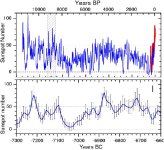T.G.G. Moogly
Traditional Atheist
Academic. Regardless the source shouldn't we be reacting? "Hey Floridians, Relax! We just determined that the rising sea levels are 51% non anthropogenic! Whew! Close call!You are still talking weather, not climate. Climate is about LONG TERM changes. Extreme weather isn't climate. Yes, Death Valley measured a temperature of 130F recently and the news media made a big deal about it. However a Death Valley temperature of 134F was recorded in 1913, over a hundred years ago. I can only imagine how a repeat of the 1930s dust bowl (of 80 to 90 years ago) would be covered..... And Death Valley tied it's all-time record from last year, for possibly the hottest temp recorded on Earth.
Yes however, long term global temperature averages have risen... that is climate. Long term global temperatures have been rising since the depths of the Little Ice Age (the coldest period of the Holocene) in the 1800s. The question for climatologists is how much of that global temperature rise is attributable to anthropogenic causes and how much is attributable to otherwise natural climate change.
So carry on with business as usual. Houston does not have a problem."

